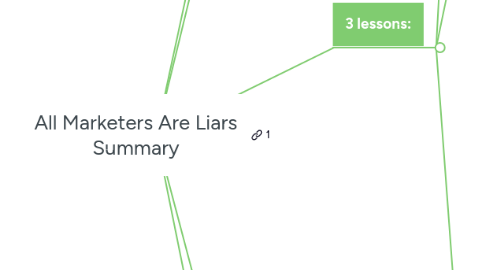
1. 1-Sentence-Summary:
1.1. All Marketers Are Liars is based on the idea that we believe whatever we want to believe, and that it’s exactly this trait of ours, which marketers use (and sometimes abuse) to sell their products by infusing them with good stories – whether they’re true or not.
2. Favorite quote from the author:
2.1. "We drink the can, not the beverage." - Seth Godin
3. 3 lessons:
3.1. Successful marketers tell stories people want to believe in.
3.1.1. The power of storytelling goes to the point where it changes the customer experience, just because of what people believe.
3.1.1.1. An example:
3.1.2. We live in a world where people buy what they want, not what they necessarily need.
3.1.3. Most of us have bought a designer piece of clothing, sportswear, device or even food from a certain brand, not because of the quality (which is something we keep telling ourselves), but because of the way it reflects our beliefs and view of the world.
3.2. You have to want to believe in a story, because that’s how your brain works.
3.2.1. The reason you think a pair of Nike’s is high quality and justifies a steep $100 price tag in addition to making you look cool, when they really just cost $5 to manufacture is the way your brain reacts to new information.
3.2.2. Like a frog can spot a moving fly by ignoring all static parts of his environment, our brains never compare new things to old things by considering all features.
3.2.2.1. You don’t check whether your new iPhone can do the same things the old one could do, you only look for the features that are new, like the better camera, lighter weight or new exterior design.
3.2.2.2. For each new feature you discover, your brain instantly starts to make up information that justifies it and leaps on to every bit of reasonable evidence it can find.
3.2.3. That’s because our brains don’t like chaos and randomness. They thrive on logic.
3.2.4. Have you ever thought your iPod is really smart, because it seems to play the same few songs you like over and over again, even when it’s set to shuffle?
3.2.4.1. Well, it’s not, but a random order of songs does never guarantee an even distribution of the songs.
3.2.5. Stories help us make sense of the world, so whatever we want to believe in, we end up doing so, because our brains start to support our beliefs, and not the other way around.
3.3. Fibs can improve the customer experience, while fraud always hurts your authenticity.
3.3.1. A fib is when you tell your spouse you had a late meeting, when really you were out shopping for their birthday present.
3.3.1.1. It’s an “honest lie”, because you tell it to improve their birthday experience, not with mean intent.
3.3.2. Even though we’d love to believe it, it’s become impossible to never buy a product that’s overpriced, because marketers have long caught on to the value of a good story.
3.3.3. But actually, that’s okay.
3.3.3.1. Because these little fibs can actually make our experience better.
3.3.3.2. If you believe those Nike’s to be the most comfortable shoes you’ve ever worn, well guess what, they become just that.
3.3.3.3. Fibs are okay to use on occasion, as long as they genuinely improve the experience.
3.3.4. Frauds however, are a whole other topic.
3.3.5. Consumers always catch fraud, it’s just a matter of time.
3.3.5.1. An example:
3.3.6. Target the right people with an honest message from the get-go and build a long-lasting relationship instead.
3.3.6.1. The short-term benefits never outweigh the long-term value of a true connection.
